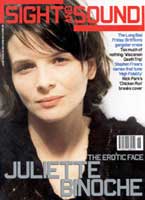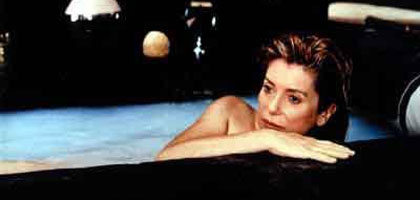
Pola X
France/Germany/Japan/Switzerland 1999

Reviewed by Gavin Smith
Synopsis
Our synopses give away the plot in full, including surprise twists.
France, the present. Wealthy young Pierre Valombreuse lives in Normandy with his mother Marie on the family's estate. He is the author of the best-selling novel In the Light. Pierre divides his time between visiting his fiancée Lucie and writing his second novel. When Lucie's brother Thibault returns after a long absence, he and Pierre have an uneasy encounter. Pierre becomes aware of a mysterious homeless woman who seems to be following him.
One night, he comes across the woman, Isabelle, wandering down a country road. Isabelle describes the atrocities she has witnessed in an unspecified Eastern European country and explains she is the illegitimate daughter of his late father, a celebrated diplomat, long kept a secret by Marie. Stunned, Pierre renounces his former life and leaves for Paris with Isabelle and her companions, refugee Razerka and her young daughter. But after the death of Razerka's daughter, he and Isabelle move in with a commune in a warehouse where he is left alone to concentrate on his writing. Marie dies in a motorcycle accident. Lucie finds Pierre, but gradually realises he and Isabelle are now lovers. Pierre finishes his manuscript but it is rejected by his publisher. At wit's end, Pierre steals a gun from the cult's leader, tracks down Thibault and kills him. As he is being led away by the police, Isabelle throws herself in front of an emergency vehicle and is killed.
Review
Whether one regards Pola X as a preposterous self-indulgent folly or as an improbable triumph of romantic audacity - in fact it's a bit of both - there's no denying Léos Carax's intense imagination and commitment. His act of hubris and commercial perversity in updating and transposing to contemporary France Herman Melville's critically savaged 1852 novel Pierre, or the Ambiguities may be freighted in more ways than one. As a not-so-distant scion of the Dupont dynasty, Carax himself hails from a background similar to Pierre's. Carax has indicated that the book has been an important one to him for many years and it's not such a great leap to discern some degree of over-identification with Melville's critical and commercial misfortunes. The film's very title, an acronym of the book's French title (Pierre, où les Ambiguitiés), foregrounds the act of adaptation, bringing us back to authorial will. On one level the film is an unmistakable if masochistic act of self-parody comparable to Melville's. Even without the comedy of Pierre's metamorphosis from graceful novelist of leisure into caricatured starving artist, there's little doubt the publisher's evaluation of his manuscript ("A raving morass that reeks of plagiarism,") is a just one. On another level, the film, in all its deranged grandeur, represents a defiant refusal to capitulate to the dictates of commerce after the failure of Les Amants du Pont-Neuf and nearly ten years in the wilderness.
At the same time, more than in any of his previous films, Carax invests the narrative with highly charged subtext. Pierre's relationships with his mother and Thibault are visibly fraught with intimations of prior or latent sexual interest. Pierre and Marie address one another as "brother" and "sister" and enjoy an unusual level of intimacy. Pierre's blonde cipher-fiancée Lucie and the dark waif Isabelle seem equally passive manifestations of Pierre's implicit psychosexual crisis. Lucie is little more than a projection of Pierre's own self-absorbed aristocratic entitlement, but as his cousin and a mirror image of his mother, she represents the next best thing to Marie herself.
Isabelle by contrast is a projection of Pierre's guilt and self-loathing, a return of the repressed in both personal and historical terms. As his half-sister, she represents an opportunity to succumb to his desire for an "unnatural" (incestuous) relationship. At the same time she is a reproachful spectre, an incarnation of the unspeakable suffering that has underwritten a century of European genocide in which his father and his class are implicated. This is made manifest in the film's stunning prologue montage: an image of the earth from space accompanied by a voiceover quotation from Hamlet ("The time is out of joint..."), smash-cuts to dropping bombs. From this Carax cuts to the paradise of the Valombreuse estate, making an explicit connection between Pierre's privilege and the horrors of 20th-century war.
Carax doesn't idealise Pierre or the world he falls from any more than the cold industrial urban hell he descends into. In fact, the film's most remarkable formal aspect is its bold use of visuals to balance the two realms. In one of the film's pivotal scenes, Isabelle's audaciously over-extended monologue explains her backstory as she and Pierre make their way through the woods at twilight. Carax tests legibility and exposition to breaking point in this scene, and its visual liminality becomes a metaphor for the contradictions in the director's uniquely self-defeating talent. His narrative and formal risk-taking are indistinguishable from failure.
Credits
- Director
- Léos Carax
- Producer
- Bruno Pesery
- Screenplay
- Léos Carax
- Lauren Sedofsky
- Jean-Pol Fargeau
- Inspired by the novel Pierre; or, the Ambiguities by Herman Melville
- Director of Photography
- Éric Gautier
- Editor
- Nelly Quettier
- Art Director
- Laurent Allaire
- Music
- Scott Walker
- ©Arena Films/Pola Production/Théo Films/
France 2 Cinéma/
Pandora Filmproduktion/
Euro Space/Vega Film - Production Companies
- Arena Films presents in association with Pola Production/Théo Films (Paris)/Pandora Filmproduktion (Cologne)/Euro Space (Tokyo)/Vega Film (Zurich)
- With the participation of Canal+/La 7 - Arte/ARD-Degeto/Télévision Suisse Romande (TSR)
- With the support of Eurimages/Filmstiftung Nordrhein-Westfalen/
Filmförderungsanstalt Berlin/Centre National de la Cinématographie/
Procirep/L'Office Fédéral de la Culture du Département Fédéral de l'Interieur (Berne)/
Amuse Video/Digital Media Lab/TV Tokyo/
Taiwa Inc/Dentsu (Japan) - Executive Producers
- Albert Prévost
- Raimond Goebel
- WDR Commissioning Editor
- Wolf-Dietrich Brücker
- Associate Producers
- Karl Baumgartner
- Kenzo Horikoshi
- Ruth Waldburger
- Production Managers
- Sylvie Barthet
- Dschingis Bowakow
- Unit Production Managers
- Christophe Frossard
- Odile Marcel
- Germany:
- Detlev Jansen
- Marcelo Busse
- Post-production Supervisor
- Françoise Piraud
- Assistant Directors
- Gabriel Julien-Laferrière
- Émile Louis
- Mathilde Cukierman
- Arnauld Mercadier
- Richard Kravetz
- Delphine Lemoine
- Myriam Segall
- Diane Stein-Bois
- Germany:
- Surk-Ki Schrade
- Jürgen Jansen
- Script Supervisor
- Élie Poicard
- Casting
- Antoinette Boulat
- Germany:
- Eve Kirchner
- Outcast
- Steadicam Operators
- Carlos Cabecerán
- Patrick de Ranter
- Special Digital Effects
- Ex Machina (Paris)
- Special Effects
- Ex Machina (Paris)
- Germany:
- Flash Art
- Set Decorators
- Régine Constant
- Germany:
- Anique-Fatum Celikasian
- Sculptors
- Jean-François Grand
- Anne Dollet
- Laurent Garenne
- Michel Tancelin
- Wardrobe
- Corinne Bruand
- Camille Ballouhey
- Germany:
- Claudia Maria Braun
- Elke Freitag
- Make-up
- Bernard Floch
- Germany:
- Esme Sciaroni
- Kerstin Baar
- Hairdressers
- Stéphane Malheu
- Music Supervisor
- Negus-Fancey Co Ltd
- Music Recordist/Mixer
- Geoff Foster
- Soundtrack
- themes "Light", "Isabel" by Paris Philharmonic Orchestra, conducted by Jean-Claude Dubois, Christophe Guiot (1st violin); electronic theme "Pola X" by Ian Thomas, Ralph Salmins (tambours), John Giblin (bass guitar), Hugh Burns, Clem Clempson, Steve Donnelly, Jay Stapley (guitars), Brian Gascoigne (keyboards), Alasdair Malloy, Martin Owen, Julian Poole (percussion); other themes by Sean Andrews (rapper)
- Sound
- Jean-Louis Ughetto
- Béatrice Wick
- Jean-Pierre Laforce
- Sound Re-recording
- Vincent Montrobert
- Frank Mettre
- Co-sound Re-recordist
- Stéphane Thiebault
- Recorders
- Carl Goetgheluck
- Benjamin Viot
- Dialogue Editor
- Valérie Deloof
- Sound Effects
- Pascal Chauvin
- Pascal Dedeye
- ADR Recordists
- Jean-Pierre Houel
- Jean-Louis LeBras
- Post-synchronization
- Marion Lorthioir
- Equestrian Adviser
- Mario Luraschi
- Armourer, Germany
- GOS Filmservice
- Animal Trainer
- Pierre Cadéac
- Fauna & Films Villemer
- Cast
- Guillaume Depardieu
- Pierre Valombreuse
- Katerina Golubeva
- Isabelle
- Catherine Deneuve
- Marie
- Delphine Chuillot
- Lucie de Boisieux
- Laurent Lucas
- Thibault
- Patachou
- Marguerite
- Petruta Catana
- Razerka
- Mihaela Silaghi
- the little girl
- Sharunas Bartas
- the boss
- Samuel Dupuy
- Fred, houseboy
- Mathias Mlekuz
- TV presenter
- Dine Souli
- taxi driver
- Miguel Yeco
- Augusto
- Khireddine Medjoubi
- café owner's son
- Mark Zak
- Romanian friend
- Anne Richter
- chef's wife
- Myriam Defremont
- Michel B. Duperial
- Pascal Parmentier
- Jean-Jacques Colin
- policemen
- Bill 'Smog' Callahan
- Mario Gremlich
- Bobo
- Kerstin Fischer
- Tom Ivison
- Tom Liwa
- Thomas Klein
- Peter Sarach
- Fritz Wittek
- Till Lindemann
- Steve Donnelly
- Christoph Schneider
- Stefan Claudius
- Stuart Grimshaw
- Roland Höppner
- Markus Kirschbaum
- Axel Neumann
- Martin Siry
- Julia Zanke
- Kersten Ginsberg
- musicians
- Mouloud Larabi
- Blanche de Saint Phalle
- Marie Thomas
- Albert Prévost
- Sandrine Fleischmann
- Catherine Genièvre
- Certificate
- 18
- Distributor
- Artificial Eye Film Company
- 12,087 feet
- 134 minutes 18 seconds
- Dolby Surround/DTS
- In Colour
- Subtitles
